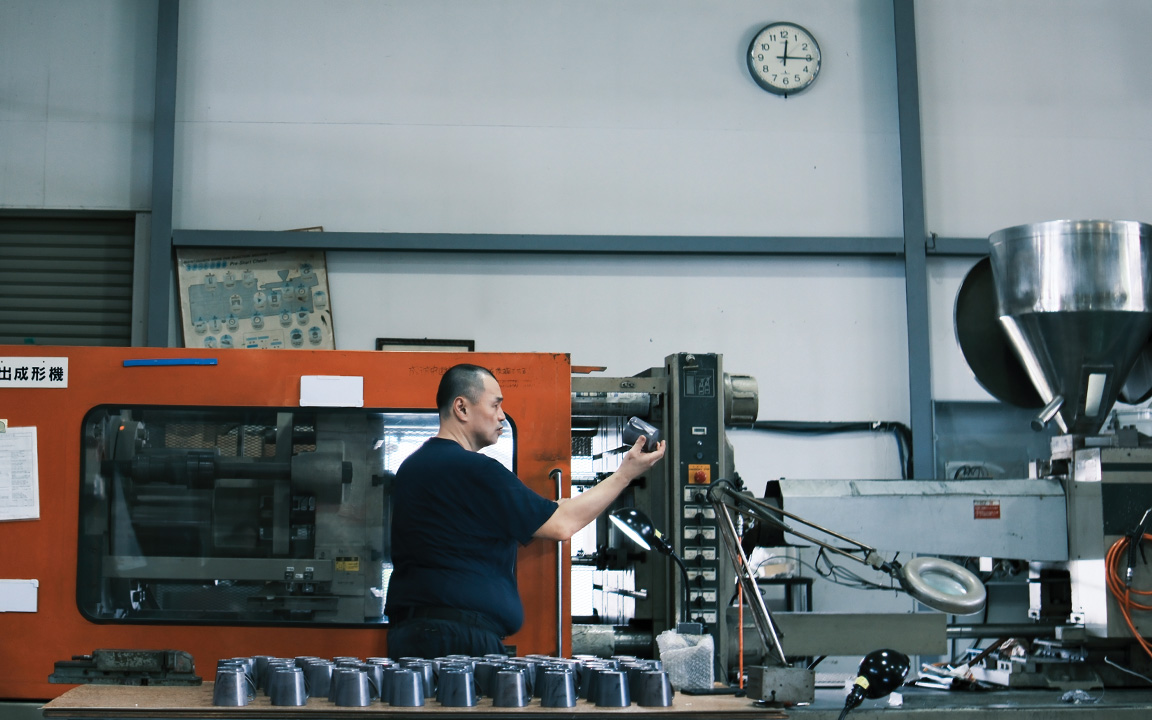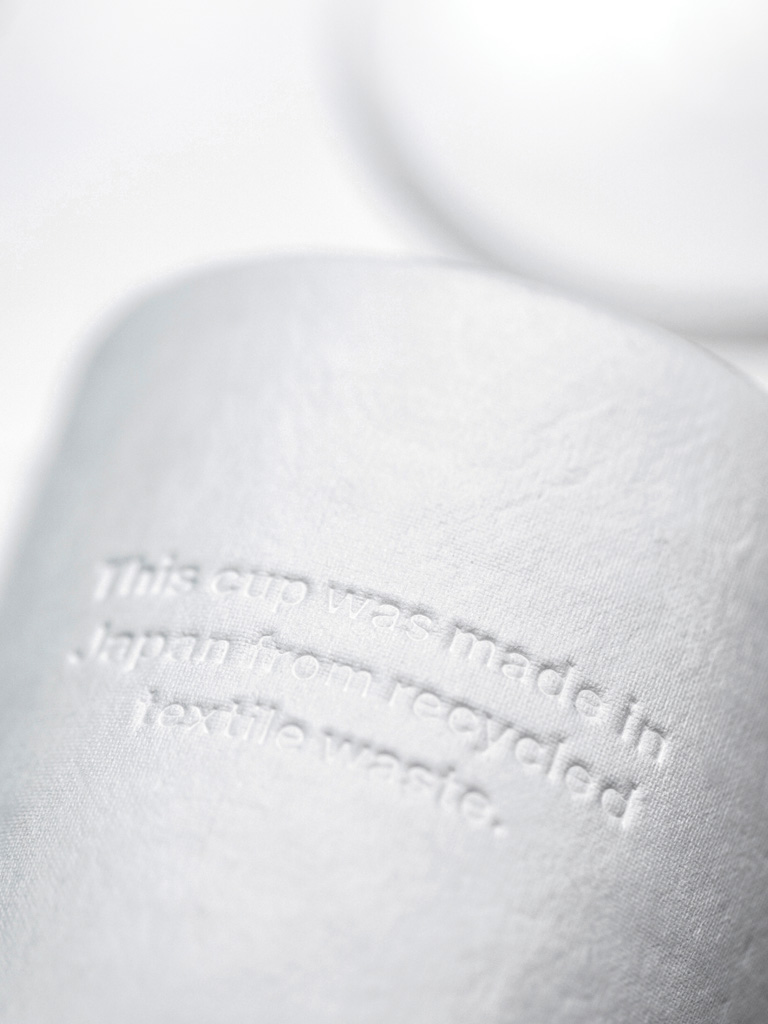In early autumn 2024, 5,000 beautifully-designed mugs finally arrived at Hactl. The mugs were lightweight and smooth, and their cobalt blue colour looked strangely familiar...
In 2023, Hactl redesigned all of its staff uniforms for the first time in twenty years, creating more comfortable and better-fitting workwear, while also exploring ways to recycle its old, unissued spare uniforms. The aim was to ensure that not a single old uniform would end up in landfill.
Fashion designer Lo Sing-chin (Sing), the designer of Hactl’s new uniforms, recounts: “When Hactl invited me to design its new clothing, they emphasised the need to recycle the discarded old uniforms. They did not want to see the old uniforms becoming waste.”
“I had never met a client with such a request. It was impressive that a company would take such responsibility for its waste. Disposing of used things may have no apparent cost, but there is actually a tremendous cost to our environment and our planet.”
Following Hactl’s 2023 initiative to re-purpose a batch of old cotton uniforms into stylish and practical holdalls, cute teddy bears and useful coasters, Hactl continued to explore ways to give new life to old uniforms made from mixed fibres. However, the polyester fibre recycling industry in Hong Kong is currently not well developed, so it was necessary to look for solutions overseas.
Sing recalls how, earlier in 2024, he had learned by chance about a Japanese company named Ecolog while attending an exhibition. This company specialises in recycling discarded clothing, and employs innovative technology to extract and pelletise the polyester fibres from old garments, which can then be used to create recyclable hangers, cups, holdalls and other everyday items.
“It’s amazing,” continues Sing. “Although I’ve always been concerned about environmental issues, I’ve never heard of this technology. Sustainability has endless possibilities,” he adds.

5,000 mugs
Polyester, also known as PET (Polyethylene terephthalate), is a very common constituent of fabric today. According to statistics from the environmental organisation Greenpeace, over 60% of clothing is made from polyester. However, this material also poses significant environmental threats: the tiny fibres shed from polyester – also known as microplastics – are one of the major sources of marine pollution.
Ecolog was originally established in 1994 by companies in the Japanese textile industry including a garment manufacturer. Having realised the huge amount of waste generated by clothing, and its environmental impact, the company adopted the German business model to develop recycling methods for polyester fibres, polyester/cotton, and polyester/wool natural fiber blends. Today, in collaboration with related factories in Japan, Ecolog is capable of processing nearly all types of synthetic fibres including polyester, nylon, and acrylic.
At the Ecolog factory in Fukuyama, Japan, workers meticulously cut up Hactl’s old uniforms, removing non-recyclable materials such as metal trims and accessories, buttons, and zippers. The fabric is then put into a large machine to separate the synthetic and natural fibres.
Kazuo Tanabe, Executive Vice President of Ecolog, explains that many garments are made from a mix of man-made and natural materials, such as polyester, cotton and wool. To separate these, Ecolog has introduced an innovative process: by adding enzymes into a high-speed spinning machine, the natural fibres in the garments are dissolved in the process, leaving the polyester fibres intact.
“Our primary goal is to recycle polyester materials,” explains Kazuo Tanabe, “but the technology for separating and breaking down polyester and natural fibres is very new. The conditions for separating and breaking down different products vary, so the whole process is very time-consuming and labour-intensive.”
Watching the old windbreakers go through these complex processes, and finally be transformed into plastic pellets, was truly amazing for Sing. Shortly after, the plastic pellets were sent to another factory, where the 5,000 mugs were moulded at high temperature. Most importantly, these mugs will be recyclable into other high value-added products in the future, so contributing to a circular economy.

Perfect match
The collaboration with Hactl is a new departure for Ecolog, as the Japanese company has never formally worked with any overseas business. After several rounds of discussions, Ecolog realised that Hactl was a company that highly values environmental protection, sustainable development, and employee well-being. These shared values drew both parties together and in due course enabled them to achieve their respective goals.
Says Ecolog’s CEO Akio Wada: “When recycling Hactl’s old uniforms, we encountered many technical challenges and conducted multiple tests. This was a very challenging project, but we were optimistic that we would meet Hactl’s needs. We were very pleased when we successfully overcame all the challenges.”
Reflecting on the 1990s, Mr. Wada said that “recycling” was far from a trend. While people were supportive of environmental protection, they had reservations about whether it was commercially viable to achieve a circular economy. Over the years, more and more companies have started to engage in environmental protection, but Akio Wada was deeply impressed by the efforts and passion that Hactl has dedicated to this cause.
Mr. Wada adds that the collaboration with Hactl marks a milestone for his company. “We celebrate our 30th anniversary this year. This initiative represents the beginning of a new era for Ecolog as we move into the next 30 years. Being able to partner with Hactl for the first time is a crucial step for us to expand our business in the rest of the world. We are very grateful for this opportunity.”

He emphasises that the end products created by recycling or upcycling must truly meet users’ needs and be regularly used in daily life.
Designed for life
The journey doesn’t stop with the successful production of the mugs. Hactl once again collaborated with local social enterprise “Cou Tou Studio”, to repurpose discarded furniture into lids for the 5,000 mugs. The wooden lids resemble buttons, reminding users that the mugs originate from clothing.
Sing adds that, in today’s fast fashion world, new clothing is released every week throughout the year, creating an immeasurable amount of waste.
“From the initial step of pattern-making to other production procedures down the line, fast fashion generates a significant amount of fabric waste. Not to mention the vast quantities of clothing produced—people keep buying it, only to quickly discard it,” he says. As someone working in the fashion design industry, Sing hopes to contribute to environmental protection, a vision that aligns perfectly with Hactl’s.
“Hactl has genuinely invested great effort into the entire process of recycling its old windbreakers. The finished mugs were sent to the relevant authorities in Japan for checking, and have passed all food safety inspections, ensuring that everyone can use them with peace of mind,” Sing concludes. He emphasises that the end products created by recycling or upcycling must truly meet users’ needs and be regularly used in daily life; otherwise, they would result in another form of waste.


